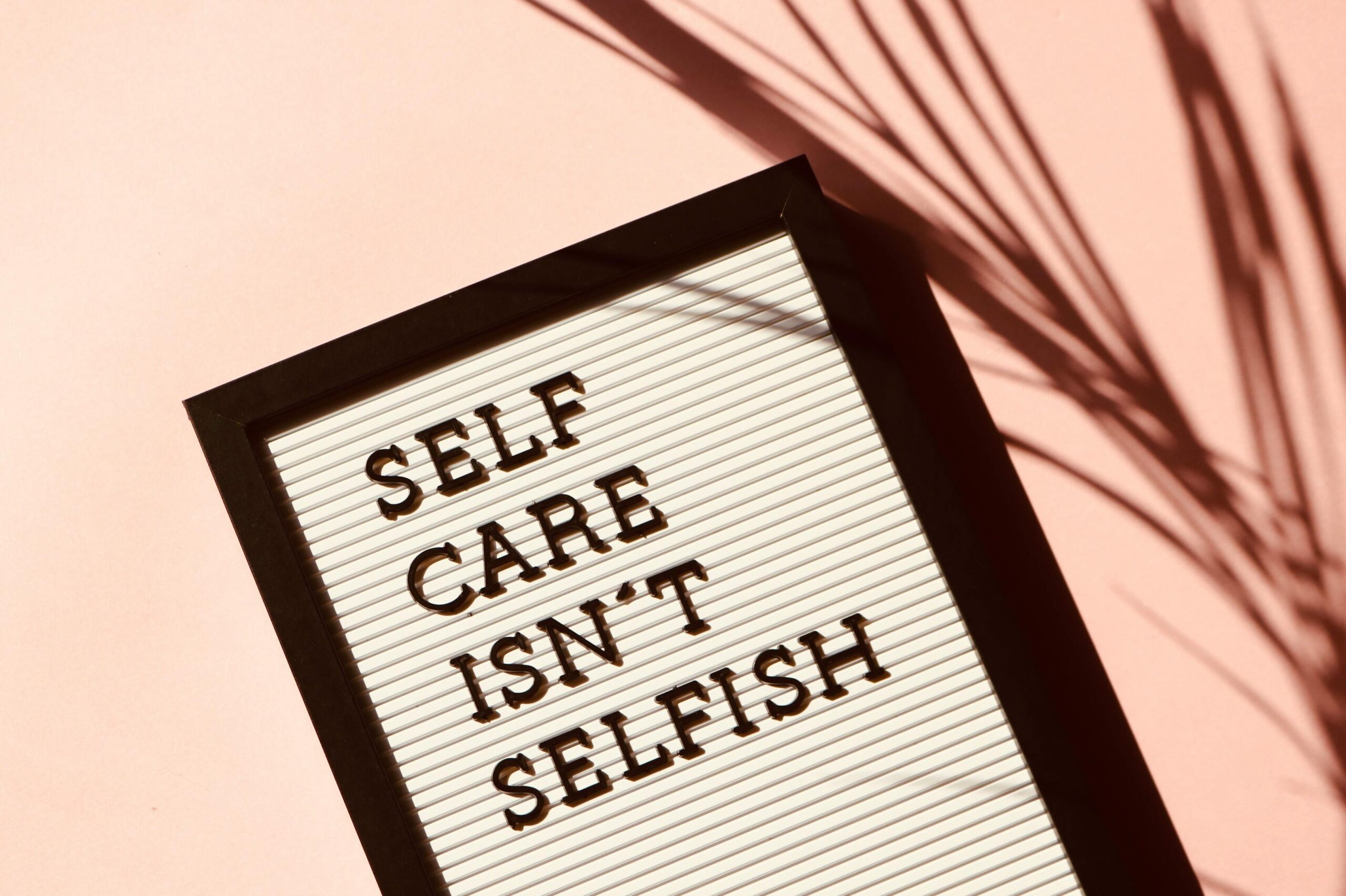
The Importance of Self-Care and Why It’s Not Selfish
So, I had to have an honest conversation with my friend Emma about self-care. Emma is a hardworking mom of two who, like so many people, always puts everyone else’s needs above her own. When I asked her when she last did something just for herself, she paused. It had been months since she had taken even a few minutes to relax, or do something she enjoyed. “I just don’t have the time,” she said. But here’s the thing: self-care isn’t about being selfish. It’s about taking care of yourself so you can take care of others. Emma’s story isn’t unique—many of us fall into the trap of believing that self-care is a luxury, but the truth is, it’s a necessity.
In today’s fast-paced world, many women, especially mothers and working professionals, often feel guilty about prioritizing their own needs. The fear of being labeled “selfish” for taking a break is pervasive. Selfcare is a crucial element of maintaining physical, emotional, and mental well-being.
Let’s dive into the importance of self-care and why it’s essential to embrace it
What Is Self-Care, Really?
Self-care isn’t just bubble baths and spa days (though those can certainly help!). According to the World Health Organization (WHO), self-care is defined as the ability of individuals, families, and communities to promote health, prevent disease, maintain health, and cope with illness or disability with or without the support of a healthcare provider. It encompasses any activity that you do deliberately to care for your mental, emotional, and physical health.
In simpler terms, self-care means doing things that recharge you and help you function at your best, whether it’s taking a walk, reading a book, or simply saying no when your plate is too full.
Different Types of Self-Care
There’s no one-size-fits-all approach to self-care, and it often requires some experimenting to figure out what works best for you. Below are several categories of self-care that can make a significant difference in your well-being:
1. Physical Self-Care
This includes activities that improve your physical health. Exercise, good nutrition, and adequate sleep are fundamental. Stretching, taking a hot bath, or simply drinking enough water are also forms of physical self-care that often go overlooked.
- Exercise: According to the Mayo Clinic, regular physical activity can prevent many chronic diseases such as heart disease, stroke, and diabetes. Even small amounts of exercise, like a 15-minute walk, can reduce stress and boost your mood.
- Sleep: Ensuring you get 7-9 hours of sleep nightly is vital for maintaining cognitive function, mood regulation, and overall health.
2. Emotional Self-Care
This involves taking the time to process your feelings and emotions. It’s about creating healthy outlets to express what you’re going through, whether it’s talking to a friend, writing in a journal, or seeking professional help from a therapist.
- Emotional Validation: According to Dr. Susan David, a psychologist at Harvard Medical School, validating your emotions rather than suppressing them leads to greater emotional resilience and overall well-being.
3. Mental Self-Care
Keeping your mind sharp is just as important as taking care of your body. Mental self-care can include activities like reading, learning a new skill, or engaging in hobbies that stimulate the mind. Reducing cognitive overload, by disconnecting from screens or social media for a time, can also help restore mental clarity.
- Mindfulness and Meditation: Engaging in mindfulness practices or short meditation sessions daily can reduce anxiety and help you stay grounded in the present moment. Worried about how to begin your meditation and mindfulness journey, our Beginners Guide to Mindfulness will help give you a headset.
4. Social Self-Care
Maintaining healthy relationships is an often overlooked aspect of self-care. Nurturing positive social connections can boost your mood, provide emotional support, and even improve your physical health. Reaching out to friends, spending time with family, or even joining a group with similar interests can improve your sense of belonging.
According to a 2023 survey by the American Psychological Association, over 60% of adults report feeling lonely. Engaging in social self-care, such as setting time for close relationships, can combat this growing trend.
Why Self-Care Is Not Selfish
It’s easy to feel like you’re neglecting your responsibilities when you take time for yourself. But here’s the kicker: when you prioritize your well-being, you’re better able to care for others. Think of the classic analogy of putting on your own oxygen mask first on an airplane. If you’re not okay, how can you effectively help those around you?
Here are a few reasons why self-care is far from selfish:
- Improved Mental Health: According to a study by Psychology Today, regular self-care practices help reduce anxiety and depression, improve concentration, and foster resilience.
- Boosted Productivity: Taking regular breaks and practicing self-care prevents burnout, making you more productive and focused. A study from the American Psychological Association (APA) showed that individuals who engage in self-care are more likely to perform better in their professional and personal lives.
- Better Relationships: When you feel good about yourself, you can connect better with others. Self-care nurtures self-esteem and improves your capacity to love and be loved.
The Science Behind Self-Care
The importance of self-care is backed by science. Research shows that engaging in regular self-care routines has a direct impact on the brain and body.
- Reduces Stress: Chronic stress is harmful to your health, and self-care helps reduce it. The National Institute of Mental Health (NIMH) highlights that stress is a leading factor in many diseases, including heart disease and diabetes. Regular relaxation techniques, such as meditation or yoga, reduce stress hormones like cortisol and help calm the body.
- Increases Emotional Resilience: Mindfulness practices, such as meditation, help regulate emotions and increase resilience, according to research published in Frontiers in Psychology. This emotional regulation makes it easier to handle daily stressors without feeling overwhelmed.
- Promotes Longevity: Harvard Medical School reports that self-care activities like regular exercise, proper sleep, and healthy eating can boost your immune system and reduce the risk of chronic illnesses, potentially increasing your lifespan.
Self-Care Trends: What Are Women Doing Today?
In recent years, self-care has taken center stage, especially after the COVID-19 pandemic when many individuals experienced heightened stress and isolation. According to the Global Wellness Institute, the self-care industry grew exponentially during the pandemic, with many women embracing new practices to prioritize their health. Some trends include:
- At-Home Wellness: More women are creating self-care routines at home, incorporating activities like yoga, meditation apps, and skincare regimens into their daily lives.
- Digital Detoxes: With the overwhelming use of social media, more individuals are scheduling “unplugged” days to disconnect from their devices and focus on their mental well-being.
- Mental Health Awareness: Platforms like BetterHelp and Talkspace have made therapy more accessible, encouraging women to invest in their emotional health without stigma.
- Mindful Eating: There’s a growing trend toward mindful eating, where individuals focus on nutrition and well-being rather than restrictive dieting, emphasizing balance and mental health over appearance.
Practical Self-Care Tips for Women
Self-care doesn’t have to be expensive or time-consuming. Here are practical, everyday self-care tips you can incorporate into your routine:
- Set Boundaries: One of the simplest ways to take care of yourself is by learning to say no. You don’t have to attend every event or accept every invitation. Respect your time and energy.
- Prioritize Sleep: According to the National Sleep Foundation, adults should aim for 7-9 hours of sleep each night. Lack of sleep can impact mood, productivity, and overall health, making quality rest a key component of self-care.
- Move Your Body: Exercise doesn’t have to be intense. Even a 20-minute walk in nature can improve your mood and reduce stress, according to a study published in Scientific Reports.
- Practice Mindfulness: Whether it’s meditation, journaling, or simply taking deep breaths, mindfulness practices can center your thoughts and provide clarity during stressful moments.
- Make Time for Hobbies: Doing something you love, whether it’s painting, gardening, or reading, can bring joy and serve as a mental break from daily responsibilities.
Self-Care in the Workplace: It’s Just as Important
As work-from-home continues to be a trend, the boundaries between work and life have blurred. It’s more important than ever to integrate self-care into your workday. Here’s how:
- Take Regular Breaks: The Pomodoro Technique, which suggests working in 25-minute increments followed by a 5-minute break, can help maintain focus and reduce burnout.
- Set a Clear Work Schedule: Establishing a start and end time to your workday helps create boundaries and protects your personal time.
- Delegate Tasks: You don’t have to do everything on your own. Learning to delegate not only frees up your schedule but also reduces stress.
Conclusion: Self-Care Is Essential, Not Selfish
Self-care is not a luxury—it’s a necessity. It enables you to show up as the best version of yourself for the people and things that matter most in your life. By prioritizing your physical, mental, and emotional well-being, you’re building a foundation for a healthier, happier life. Remember, you can’t pour from an empty cup, and taking care of yourself is the first step in being able to care for others.
So next time you’re feeling overwhelmed, take a deep breath, and remind yourself that self-care is the opposite of selfish. It’s essential, empowering, and life-changing.
References
- World Health Organization (WHO). (n.d.). Self-Care: Definition and Scope. WHO.Mayo Clinic. (n.d.). The Benefits of Exercise. Mayo Clinic. https://www.mayoclinic.org/
- National Sleep Foundation. (n.d.). How Much Sleep Do Adults Need?. NSF. https://www.sleepfoundation.org/
- David, S. (n.d.). The Importance of Emotional Validation. Harvard Business Review. https://hbr.org/
- American Psychological Association (APA). (n.d.). The Benefits of Self-Care. APA. https://www.apa.org/
- National Institute of Mental Health (NIMH). (n.d.). Stress and Health. NIMH. Frontiers in Psychology. (n.d.). The Role of Mindfulness in Emotional Regulation. Frontiers in Psychology. https://www.frontiersin.org/articles/722017/full
- Harvard Medical School. (n.d.). The Benefits of Self-Care. Harvard Health. https://www.health.harvard.edu/heart-health/build-a-better-breakfast
- Global Wellness Institute. (n.d.). The Self-Care Industry Boom. GWI. https://www.globalwellnessinstitute.org/
- American Psychological Association (APA). (n.d.). The Impact of Loneliness on Mental Health. APA. https://www.apa.org/











